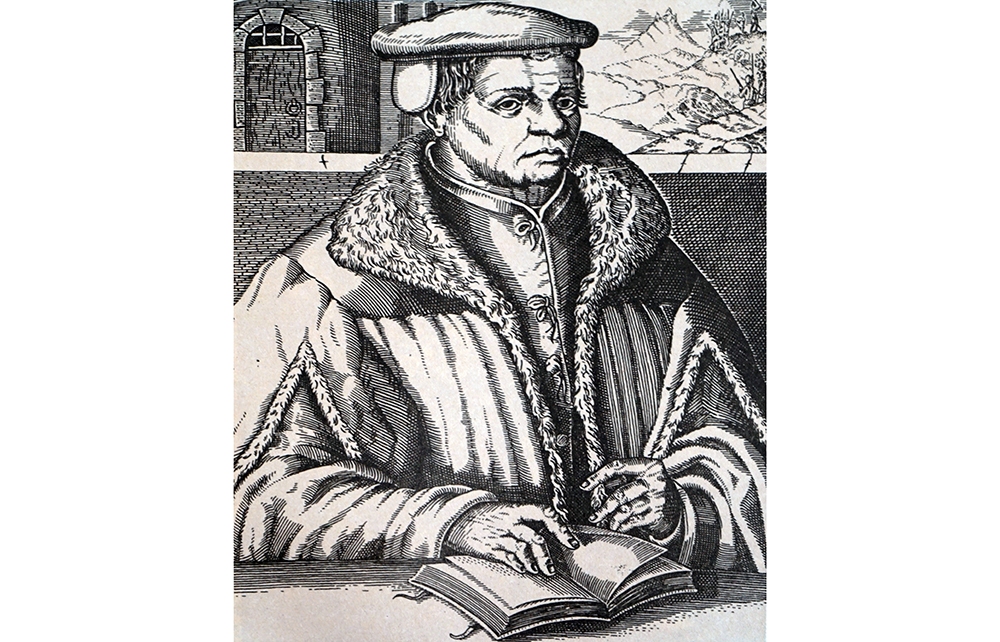‘Now tell us, you miserable wretched sack of maggots,’ wrote Thomas Müntzer, sounding like the love child of Owen Jones and Ian Paisley, ‘who made you into a prince over the people whom God redeemed with his own precious blood?’ The question Müntzer posed Count Albrecht of Mansfeld was, you’d think, rhetorical.
Like his contemporary Martin Luther, if less unremittingly scatological, the radical millenarian preacher wielded a sharp pen. Don’t forget Ezekiel’s prophecy, he wrote to Count Albrecht’s brother Ernst: ‘God would command the birds of the air to feast on the flesh of the princes and command the unthinking beasts to lap up the blood of the bigwigs.’ Only if, he added, Count Ernst admitted that God had given power to the common people would he be spared this deserved fate. ‘If you refuse, then we will not pay any attention to your lame, insipid mug. We will fight against you as an arch-enemy of the Christian faith. You know what to expect now.’
The time was May 1525 and Müntzer, the son of a coin-maker turned rabble-rousing revolutionary, was at the head of an 8,000-strong peasant army holed up in the Thuringian town of Frankenhausen. He was writing to the leaders of a makeshift alliance of Lutheran and Catholic princes and their lackeys, a force swollen by tooled-up Landsknechte (mercenaries). These last were no doubt fearsome warriors, but, if the illustration on page 257 of Andrew Drummond’s book is anything to go by, they were also flute-playing fancy Dans who accessorised slashed silk breeches with thigh garters and sported wide-brimmed hats appliquéd with fetching floral designs.
Müntzer believed the apocalypse was imminent, and in these end times the agents of God would defeat the godless
Yet it was this army who, within days of the foregoing letters being dispatched, would destroy the peasant rebels, capture Müntzer, torture him with thumbscrews and, after forcing a confession, put his 35-year-old head on a pole as a warning to others.
As he wrote these letters, though, Müntzer fancied his chances, not just because his enemies were dressed like dandy highwaymen, but because he had God on his side. Or so he thought. He believed the apocalypse was imminent, and in these end times the agents of God would defeat the godless. The sight of a rainbow in the skies of Frankenhausen on the eve of battle echoing the jaunty rainbow design of the peasants’ three-metre-wide silken flag confirmed that conviction.
The task of the Elect – whose number included Moses, Elijah, Daniel, the Apostles, Jesus and one T. Müntzer – was to lead the ‘poor in spirit’ into understanding of God’s love. Godless princes and traitorous churchmen had, Müntzer thought, used their temporal power for too long to keep the masses ignorant of the word of the Bible. Already, as a preacher in Allstedt, he had reformed the liturgy, insisting that only German be spoken. He also insisted that during church services full chapters of the gospels and epistles be read so that their messages became comprehensible and edifying rather than, as he feared they had been for millennia, mystifying hocus pocus.
In such reforms, Müntzer was following the man who would become his nemesis, Martin Luther. In 1517, the reforming theologian nailed 95 theses to the door of the castle church in Wittenberg demanding church reform, thus catalysing the Reformation. In 1522, Luther published Das Newe Testament Deuzsch, his translation of the New Testament. But Luther had disappointed the likes of Müntzer by, in 1523, defending the use of Latin Mass.
Luther retreated from his radical position, Drummond argues, for fear of upsetting Friedrich III, the elector of Saxony. Luther’s reformation, for Müntzer, was hobbled by the monk’s social conservatism, in particular his desire to court the very princes whose rule prevented common people finding their way to God. Luther, for his part, came to consider Müntzer diabolical, writing: ‘Lucky the man who has seen Müntzer with his own eyes, for he can boast he has seen the Devil in person.’
Drummond’s marvellous romp of a biography – part jolly Simon Winder-like deep dive into 16th-century Germania, part sagacious reflection on the Reformation in the manner of Diarmaid MacCulloch – aims to free Müntzer from his detractors. Tough gig. Not only did the revolutionary preacher live fast, die young and leave few writings, but worse, we chiefly know of his existence through the writings of those who hated him. The title of Drummond’s book is the same as that of the gleeful obituary Luther wrote while Müntzer’s head was still on public display. Drummond’s other leading contemporary source is, faute de mieux, Philipp Melanchthon’s The History of Thomas Müntzer, the Fomenter of the Thuringian Tumult: A Most Useful Lesson.
While Melanchthon and Luther damned Müntzer as a false prophet, ravening wolf and Satan in clerical gown, Drummond rather puts Müntzer in the ranks of defeated revolutionaries – among them, Trotsky, Rosa Luxembourg, Karl Liebknecht and Louis Blanqui. Given that all of those were atheistic historical materialists, they may not be the kind of troublemakers with whom the iconoclastic God-botherer Müntzer would choose to be associated.
Drummond, a novelist and historian, specialises in such heroic lost causes. He once wrote a beguiling account of attempts to extend rail links to the north-west Scottish highlands which, like the HS2 extension north of Birmingham, should have but didn’t happen. His sense is that Müntzer is worth attention because the long-dead loser understood something beyond Luther’s mindset: that God’s work needs to be done on three fronts – against a corrupt church, secular authority and social injustice. If history is mostly written by the winners, then what Drummond does here is a valuable corrective, showing us that losers’ stories warrant telling too.






Comments